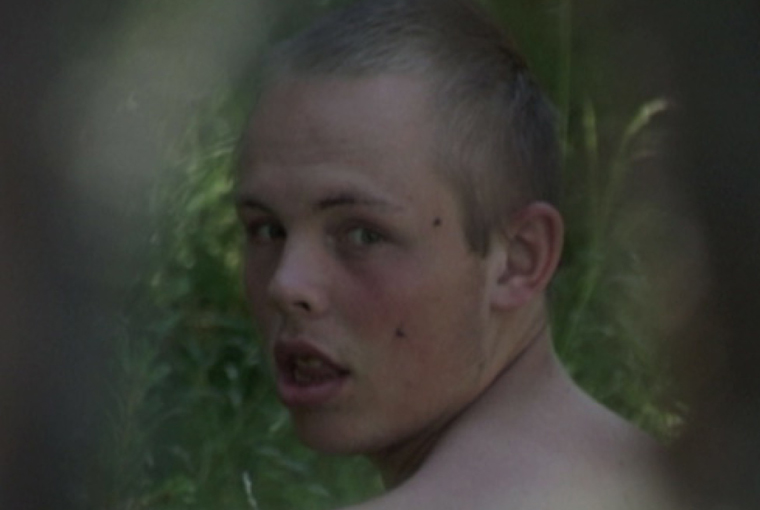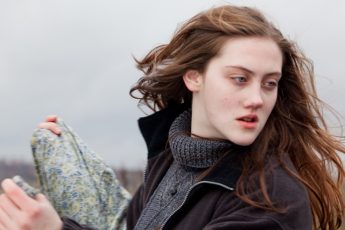Where Is Anton?
Lyubov Arkus’s Anton’s Right Here (Anton tut ryadom, 2012)
Vol. 30 (June 2013) by Anastasia Eleftheriou
It is difficult to make a film about an autistic child without touching people’s hearts. There is virtually no summary on the website autismspeaks.org that does not use empathetic vocabulary to describe the more than twenty “touching”, “heart-grabbing”, “heartwarming”, “emotional”, etc. documentaries about autism they recommend. The world has seen many films around disadvantaged individuals that have to deal with the cruelty of our society, especially apparent in a defective welfare and health system (eg. April 2013 saw the premier of Not Forgotten: the Untold Story of Autism in Ukraine). It seems that these kind of films serve well as an absolution both for the creators and the audience whose empathy, despair or hope begin and end with the films themselves. But can documentary move a bit further, making clearer implications about the lives of these people through their perspective and not through ours?
Anton’s Right Here is an admirable work in terms of images, techniques and commitment but it swims in the same pool. The author finds Anton, a young autistic boy in the suburbs of a Russian city, in her attempt to track a child who some years ago wrote a text that she found extremely revealing and touching. They meet in a mental health institution. The place is altogether inhuman and has deteriorated Anton’s mental condition. This is where the author decides to film Anton through various steps of his life, a process that will stretch out for about 6 years. Anton manages to get into a rural facility program where people with mental health problems learn some basic practical and social skills. But he fails to integrate after David, a person Anton is very closely connected to, departs. This leads Anton back to the psychiatric hospital. At the same time, his mother who is suffering from cancer, is about to die. Everybody wonders what will become of Anton once she will be gone. This question has even more weight in a poor and violent health system where autism is not even recognized as a mental health condition that demands specific care. As the film goes on we soon realize that Anton becomes part of the life of the author who invests a lot of time in taking care of Anton’s mother and thoroughly investigates all possible solutions to save the child.
The relationship developed between Anton and the author and her crew is touching and remarkable. In the background the author plays with the role of the camera which, as she claims, is “affecting” the lives and decisions of everyone involved but it seems to be also playing a crucial role on the way Anton sees himself as well as the way the others see him. In this respect, we are dealing with a very sensitive work which shows all the respect and attention required for such a touchy subject.
But the film has some problems. It begins with the author presenting herself to us as a well-trained individual made to survive in this cruel society because she “knows how to wake up, have a coffee, and work” and because anything deeper than this is dead inside her. During the film and especially towards the end she comes back to this point. Anton, she says, represents a pure human being who can only speak the language of love, a language she (and per analogy the cruel society responsible for people like Anton) has forgotten while growing up in a wake-up-and-drink-your-coffee society. This is a funny way to identify with Anton. One may ask if it is still a movie about Anton’s life or just a creative series of psychotherapy sessions of a woman confusing the serious damages affecting a child with her own? If the latter, then the anonymous clinicians are perhaps not the only ones in this movie who fail to recognize autism as a condition requiring special care.
Arkus seems to champion that humanity’s woes can be cured if we were all less cold, and self-obsessed. That’s why she decided to make a film about the effects Anton’s life has on the people around him. However, without putting in question her investment and interest about the life of the boy, one finds it at least fair to admit that the effects of people like Anton on their family, especially in disadvantaged social classes and violent health systems as met in Russia, are very different to the effects Anton may eventually have on other people. Having empathetic feelings for other people is nice, but they may be in the need for other less emotional, and heartwarming things, like access to health care, social welfare, and so on. What if you’re a less functioning, ugly autistic boy with no writing skills and with a dying mother or an alcoholic father? Will there be an emphatic person like Arkus waiting for you around the corner? If you can identify with one child, can you also identify with 200 000? These questions have political implications that may be more important than the personal change Anton incited in the author’s meaningless life.
Works like the novel The Curious Incidents of the Dog in the Night Time from Mark Haddon, and films like Henry Corra’s George show the lives of young boys with behavioral difficulties (autism or whatsoever) through a completely different perspective. What matters in these works is that we see the world through them. This world is really problematic. It is overwhelmed by egoism, injustice and lack of understanding, aspects which may further help to explain why someone would become autistic. But it also shows that these lives depend more on practical things like education, prosperity, functioning health care, and other boring technicalities than on the degree of empathy they stir in other people.
One could claim that we live in times where documentary filmmakers need to change their perspective, and authors are kindly asked to move away from the cameras they are holding without moving away from their subjects. That is hard work, no doubt.




Leave a Comment